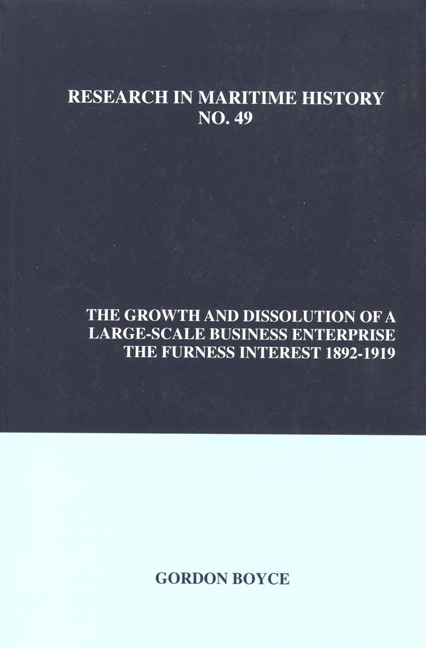Book contents
- Frontmatter
- Table of Contents
- About the Author
- Acknowledgements
- Figures and Tables
- Introduction
- Chapter 1 Furness' Shipping Services: Growth by Organic Means in the 1880s
- Chapter 2 The 1890s: Furness Withy's Expansion by Acquisition and Promotion
- Chapter 3 Diversification into the Industrial Sector, 1895-1901
- Chapter 4 Trouble on the Transatlantic Route: The Formation of the IMM and Furness' Response
- Chapter 5 The Growth of Shipping Services, 1902-1909
- Chapter 6 Industrial Operations and Performance, 1900-1914
- Chapter 7 The Growth of the Shipping Interests, 1910-1919
- Chapter 8 Structure
- Chapter 9 Finance
- Chapter 10 Holding Company Investment Activities and Intermediary Operations
- Chapter 11 Personnel
- Chapter 12 Furness
- Chapter 13 Dissolution
- Appendix 1 Development of the Combined Fleet, 1900-1919
- Appendix 2a Patterns of Ownership: The Furness Group, 1919
- Appendix 2b Reorganization of Branch Offices and Superintending Departments, 1911-1912
- Appendix 3a Fluctuations in Freights, Profits, Tonnage Afloat and Merchant Shipping Output
- Appendix 3b Output of Merchant Tonnage (Excluding Warships), 1892-1913
- Appendix 3c Fluctuations in the Price of a 7500-ton Cargo Steamer, 1898-1913
- Appendix 4 Development of the Furness Group: Principal Promotions, Acquisitions and Divestments, 1880-1919
- Appendix 5 Northern Allies and Maritime Associates
- Appendix 6 Contemporary Accounting Law and Conventions, 1845-1914
- Appendix 7 Lord Furness' Movements, 1899-1912
- Bibliography
Chapter 12 - Furness
- Frontmatter
- Table of Contents
- About the Author
- Acknowledgements
- Figures and Tables
- Introduction
- Chapter 1 Furness' Shipping Services: Growth by Organic Means in the 1880s
- Chapter 2 The 1890s: Furness Withy's Expansion by Acquisition and Promotion
- Chapter 3 Diversification into the Industrial Sector, 1895-1901
- Chapter 4 Trouble on the Transatlantic Route: The Formation of the IMM and Furness' Response
- Chapter 5 The Growth of Shipping Services, 1902-1909
- Chapter 6 Industrial Operations and Performance, 1900-1914
- Chapter 7 The Growth of the Shipping Interests, 1910-1919
- Chapter 8 Structure
- Chapter 9 Finance
- Chapter 10 Holding Company Investment Activities and Intermediary Operations
- Chapter 11 Personnel
- Chapter 12 Furness
- Chapter 13 Dissolution
- Appendix 1 Development of the Combined Fleet, 1900-1919
- Appendix 2a Patterns of Ownership: The Furness Group, 1919
- Appendix 2b Reorganization of Branch Offices and Superintending Departments, 1911-1912
- Appendix 3a Fluctuations in Freights, Profits, Tonnage Afloat and Merchant Shipping Output
- Appendix 3b Output of Merchant Tonnage (Excluding Warships), 1892-1913
- Appendix 3c Fluctuations in the Price of a 7500-ton Cargo Steamer, 1898-1913
- Appendix 4 Development of the Furness Group: Principal Promotions, Acquisitions and Divestments, 1880-1919
- Appendix 5 Northern Allies and Maritime Associates
- Appendix 6 Contemporary Accounting Law and Conventions, 1845-1914
- Appendix 7 Lord Furness' Movements, 1899-1912
- Bibliography
Summary
Like all men of his type he was loved, feared and hated.
The hypothesis that the late Victorian entrepreneur exhibited less dynamism than his forebears and was therefore responsible for the relative decline of Britain's economic growth in comparison with Germany and the US has its origin in the comments of contemporaries, including Christopher Furness, who witnessed first-hand the burgeoning strength of the country's international rivals. From the 1940s to the 1970s, historians took up the theme and pointed to specific skill-based deficiencies including haphazard sales techniques, a slowness to adopt cutting-edge technology and an inability to see the benefits of applying science and higher education to business. These critics held that of all the variables that determine the rate of economic expansion, weak entrepreneurship was the main cause of Britain's slower growth. Others challenged allegations of specific deficiencies, drew attention to instances of dynamic leadership in Britain's service and distribution industries, developed quantitative studies showing that the country's performance was not as poor as earlier critics thought and emphasized the institutional and infrastructural constraints imposed by earlier development. Overall, the debate has centred around two central issues: skill deficiencies related to under-investment in education and science, and inappropriate social and cultural values that diverted talent away from business or preserved the family basis of business and thereby hindered the installation of modern management structures and practices. Scholars' evaluation of specific factors and their approach to these broad themes reflect various interpretations of entrepreneurship.
Theories of entrepreneurship consider several constituent roles including risk-taking, “creative destruction” and arbitraging, and these functions have been blended, as it were, by Mark Casson, who characterized entrepreneurial skill as “judgmental decision-making.” This term refers to nonroutine, unprecedented decisions. This concept's breadth is useful, for it can be applied to efforts designed to modify the internal constitution of an organization as well as attempts to change the firm's external business environment. Edith Penrose examined and connected both of these entrepreneurial foci from a theoretical perspective, but subsequent historians have tended to emphasize one or the other.
- Type
- Chapter
- Information
- The Growth and Dissolution of a Large-Scale Business EnterpriseThe Furness Interest, 1892-1919, pp. 321 - 358Publisher: Liverpool University PressPrint publication year: 2012



